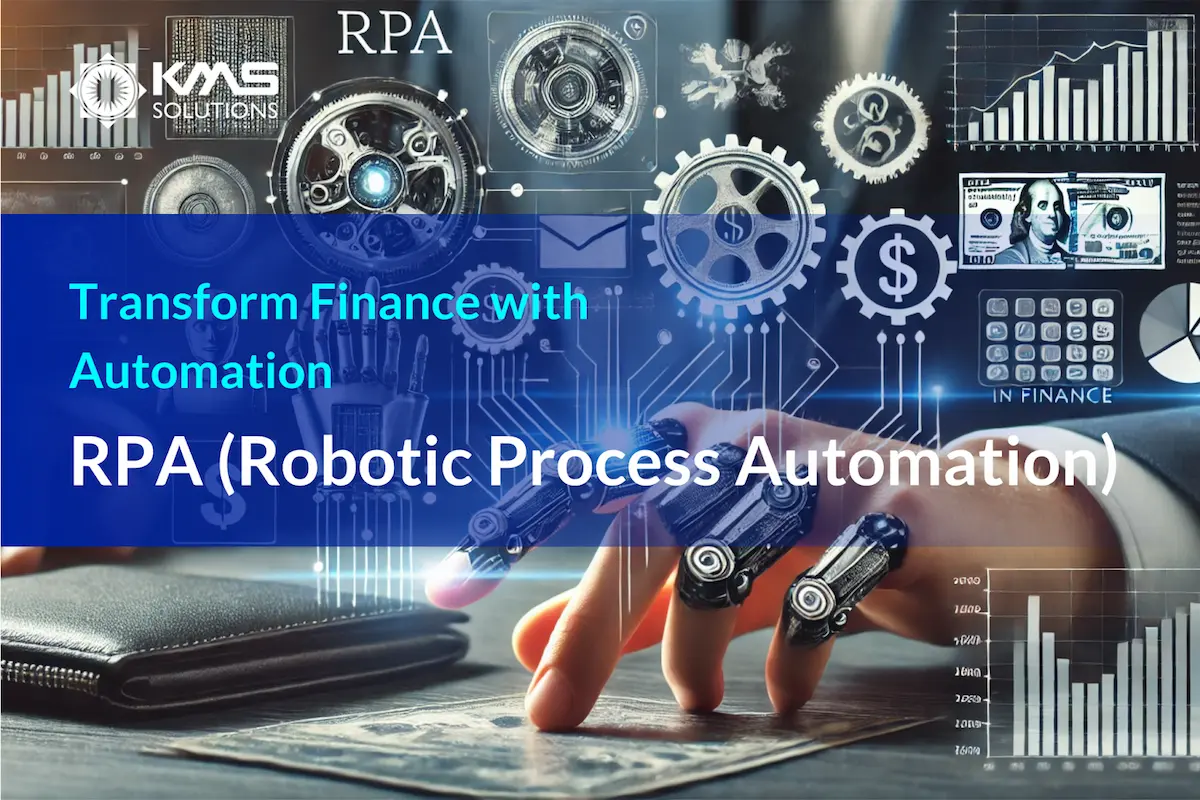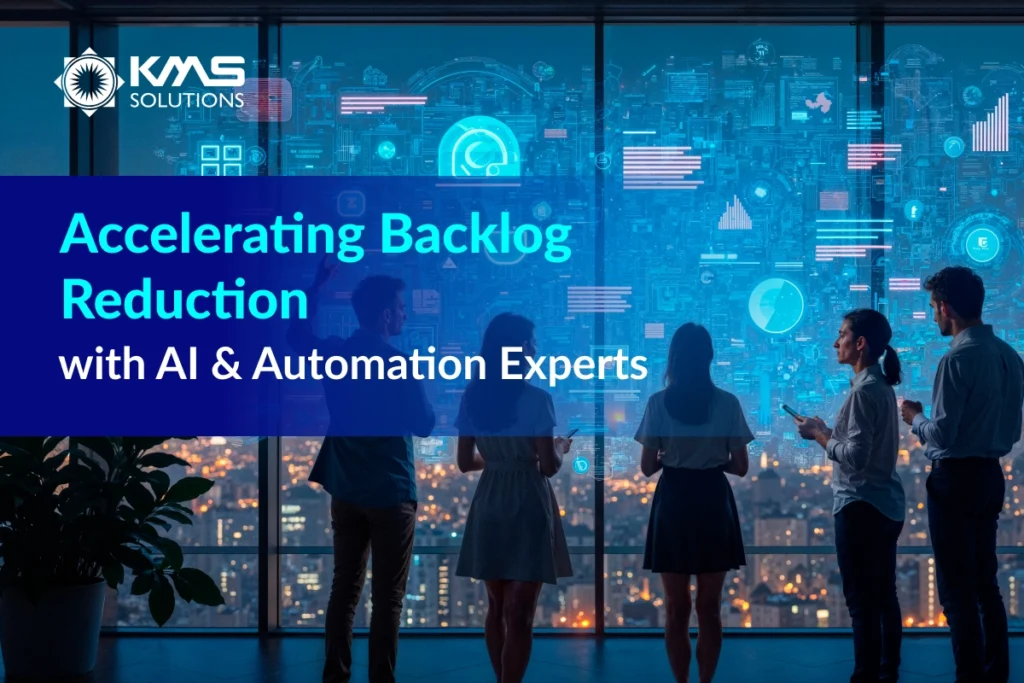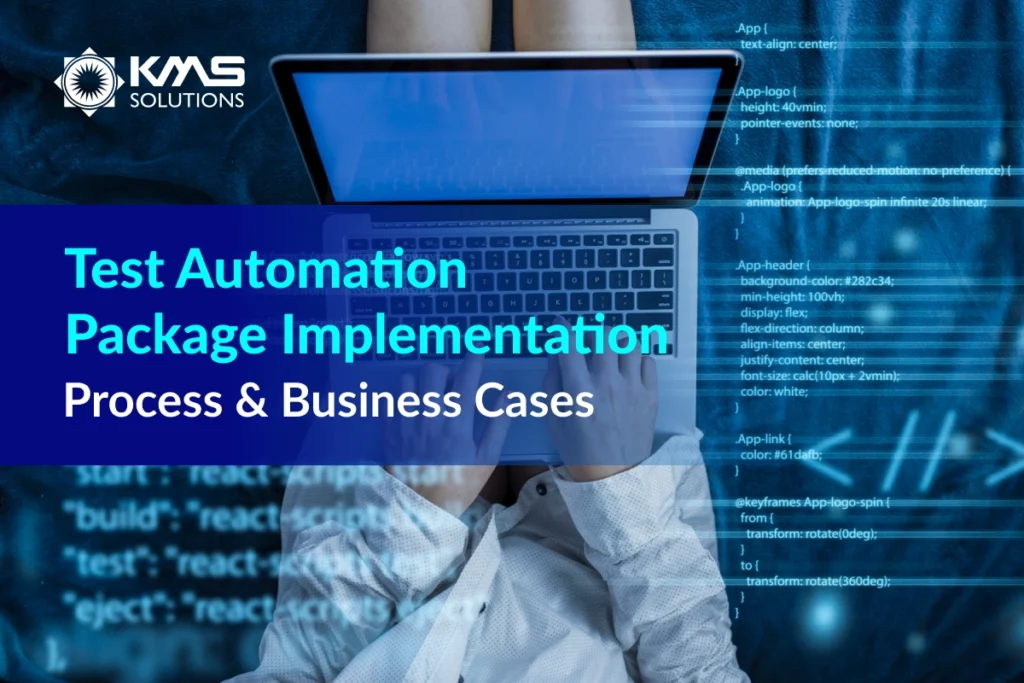Robotic Process Automation (RPA) is revolutionizing business operations by automating repetitive and time-consuming tasks. In the finance sector, process automation is a key driver of enhanced efficiency, error reduction, and cost savings. A Gartner report highlights that 80% of financial institutions have implemented RPA to boost operational speed and accuracy.
Let’s have a look at the use of RPA in finance, its significant benefits for financial processes, and how KMS Solutions is offering tailored RPA solutions to help financial institutions thrive in today’s competitive landscape.
What is Robotic Process Automation (RPA)?
Robotic Process Automation (RPA) is a technology that uses software robots, often called ‘bots,’ to automate manual, repetitive tasks that are usually performed by people. These bots can interact with digital systems in the same way that a human worker would—such as logging into applications, copying and pasting data, filling out forms, and extracting information from documents. Essentially, RPA bots can be trained to mimic human actions on a computer to streamline business processes.
RPA works by using predefined rules and logic to carry out tasks consistently and accurately. Unlike traditional software, RPA can work across different platforms, applications, and systems without requiring major changes or integrations. It’s a non-invasive technology that sits on top of your existing IT infrastructure, meaning it doesn’t disrupt your current systems but rather complements them.
When combined with advancements in AI software development, RPA becomes even more powerful, enabling bots to handle more complex and intelligent tasks, further streamlining business processes.
Here’s how RPA typically works in a finance department:
- Invoice Processing: Reading invoice details, validating information, and entering it into the financial system.
- Financial Reporting: Gathering data from different sources, compiling reports, and ensuring they are error-free.
- Payroll Management: Automating salary calculations, tax deductions, and payment processing.
RPA is all about making life easier by taking care of the tedious tasks, allowing your employees to focus on more strategic, value-adding work that requires human judgment and creativity.
Benefits of RPA in Finance
RPA brings numerous benefits to the finance industry, making operations more efficient and reducing costs. Here are the key advantages:
- Streamlining Repetitive Processes: RPA can take over tasks like data entry, transaction processing, and record-keeping, freeing up your team to focus on strategic activities that drive business growth. By automating mundane processes, finance teams can allocate their time to more impactful work, ultimately improving productivity.
- Enhancing Accuracy and Reducing Errors: RPA ensures accuracy by following consistent rules and guidelines, effectively minimizing human errors in financial data processing. This increased accuracy helps reduce the risks associated with financial inaccuracies and improves the reliability of the data.
- Cost Savings and Operational Efficiency: By automating labor-intensive processes, RPA reduces the need for extensive manual work, leading to significant cost savings. The ability to automate routine tasks such as invoice processing and report generation also speeds up operations, resulting in faster completion and ultimately boosting overall operational efficiency.
- Improved Compliance and Audit Readiness: RPA maintains detailed logs of every action it performs, making it easier for finance teams to stay compliant with regulatory requirements of the BFSI industry. Automation ensures that all required processes are followed consistently, reducing the risk of non-compliance and simplifying audit procedures.
- Scalability and Flexibility: RPA solutions are highly scalable, meaning they can grow alongside your business. Whether it’s handling an increase in transaction volume during a peak period or expanding automation to new areas, RPA offers the flexibility to adapt without requiring significant additional resources.

RPA Use Cases in Finance
Accounts Payable and Receivable Automation
In finance, managing accounts payable and receivable can be time-consuming. RPA automates the process of invoice management and payment reconciliation, allowing financial teams to focus on more strategic activities. Bots can capture invoice details, validate information, and even match invoices to purchase orders, ensuring faster processing.
Compliance and Risk Management
Compliance is a critical component in the financial sector. RPA bots can monitor regulatory updates, audit data, and ensure all operations are in alignment with compliance requirements. They can also generate audit reports with complete logs of each activity, reducing the risk of non-compliance.
Customer Service Automation
Financial institutions receive numerous client inquiries regarding transactions, statements, or account updates. RPA can handle routine queries by automating responses, providing customers with real-time information and freeing up customer service teams to address more complex issues.
For related technologies, explore artificial intelligence in finance and artificial intelligence in banking.
How to Get Started with RPA
To successfully deploy Robotic Process Automation (RPA) in finance with KMS Solutions, the process involves several strategic and technical steps that ensure both immediate efficiency and long-term scalability. Below is a deeper look at each stage of the deployment.
1. Define Clear Objectives and Strategic Alignment
Successful RPA deployment begins by aligning the automation initiative with your organization’s broader goals. This involves setting clear objectives—such as improving accuracy in financial reporting, reducing manual intervention in processes like invoice reconciliation, or enhancing regulatory compliance. According to industry experts, defining success metrics such as error reduction, cost savings, and time saved is critical for creating a measurable framework. For example, automating tax compliance processes can eliminate manual errors while significantly speeding up month-end closing processes.
KMS Solutions supports this step by conducting thorough assessments of financial workflows to identify the best candidates for automation. Typical targets include repetitive, rules-based tasks such as accounts payable and receivable, payroll processing, and compliance reporting. By focusing on tasks with high volumes or significant operational impact, KMS ensures that the RPA delivers optimal ROI.
2. Conduct an In-Depth Process Audit and Select Automation Candidates
An in-depth process audit is key to evaluating which workflows are ripe for automation. Processes that are highly repetitive and prone to human error, such as data extraction or report generation, are prime candidates. KMS Solutions uses advanced process mining techniques to map and analyze these workflows. The goal is to understand the specific financial tasks, their frequency, and the business value that automation would bring. This level of scrutiny ensures that RPA is not applied to inappropriate tasks that could increase risk, such as those requiring complex decision-making or creativity.
3. Build a Comprehensive Business Case with Detailed ROI Analysis
A solid business case is essential for securing buy-in from stakeholders and ensuring proper resource allocation. This case should quantify expected benefits in terms of cost reduction, process accuracy, and time savings. KMS Solutions collaborates with your financial leadership to build this case, providing detailed ROI analyses based on industry benchmarks and past projects. Metrics such as reduced error rates, faster processing times, and fewer manual interventions provide concrete data for demonstrating the value of RPA to decision-makers.
For instance, a major financial institution using RPA to automate its accounts payable process was able to reduce processing times by over 50%, while improving data accuracy by up to 70%.
4. Design and Plan for Seamless Integration and Risk Management
A successful RPA deployment relies heavily on thorough planning. KMS Solutions ensures that the integration of RPA into your existing financial systems is seamless by developing custom automation workflows that reflect your specific business needs. This phase also includes risk management strategies, ensuring that potential integration issues with legacy systems are addressed before deployment. Additionally, KMS plans for scalability, ensuring that the initial pilot can be expanded across departments as necessary.
A key part of this planning involves ensuring compliance with all relevant regulations, especially in heavily regulated industries like finance. KMS Solutions works with your compliance team to design workflows that maintain full audit trails, providing transparency and accuracy in reporting.
5. Develop and Rigorously Test Bots to Ensure High-Performance
Once the design phase is complete, KMS Solutions moves to the development of customized RPA bots. These bots undergo rigorous testing in a controlled environment to ensure they can handle real-world scenarios with high accuracy and reliability. The testing phase includes edge case analysis, stress testing, and user acceptance testing to ensure the bots function as intended under various conditions.
KMS employs iterative testing, where bots are continually refined based on test results. This reduces the risk of deployment errors and ensures smooth integration with live financial operations. For example, testing might reveal that additional error-handling logic is needed for a bot managing financial data extraction from invoices, leading to a more robust automation solution.
6. Pilot Deployment and Gradual Scaling
Rather than immediately rolling out RPA across all financial processes, KMS Solutions recommends a phased approach, starting with a pilot deployment. This allows for close monitoring of bot performance in a live environment, collecting user feedback, and resolving any unforeseen issues before scaling. A phased deployment reduces the risk of system-wide disruptions and ensures that the automation is scalable and adaptable to future changes in processes or regulatory requirements.
For example, a financial institution might first automate its invoice processing, monitoring the success of the deployment over several weeks before expanding RPA to other areas like payroll or compliance.
7. Continuous Monitoring, Feedback, and Optimization
After deployment, the journey doesn’t end. KMS Solutions provides ongoing monitoring and optimization to ensure that the RPA bots continue to meet performance targets. By regularly tracking key metrics such as processing times, error rates, and user satisfaction, KMS identifies areas for improvement and fine-tunes the bots as needed. This continuous optimization ensures that your RPA solution remains agile and scalable, adapting to changes in your financial operations or regulatory environment.
For example, RPA bots deployed for compliance reporting may require updates as new regulations are introduced, and KMS ensures that these updates are implemented efficiently without disrupting operations.
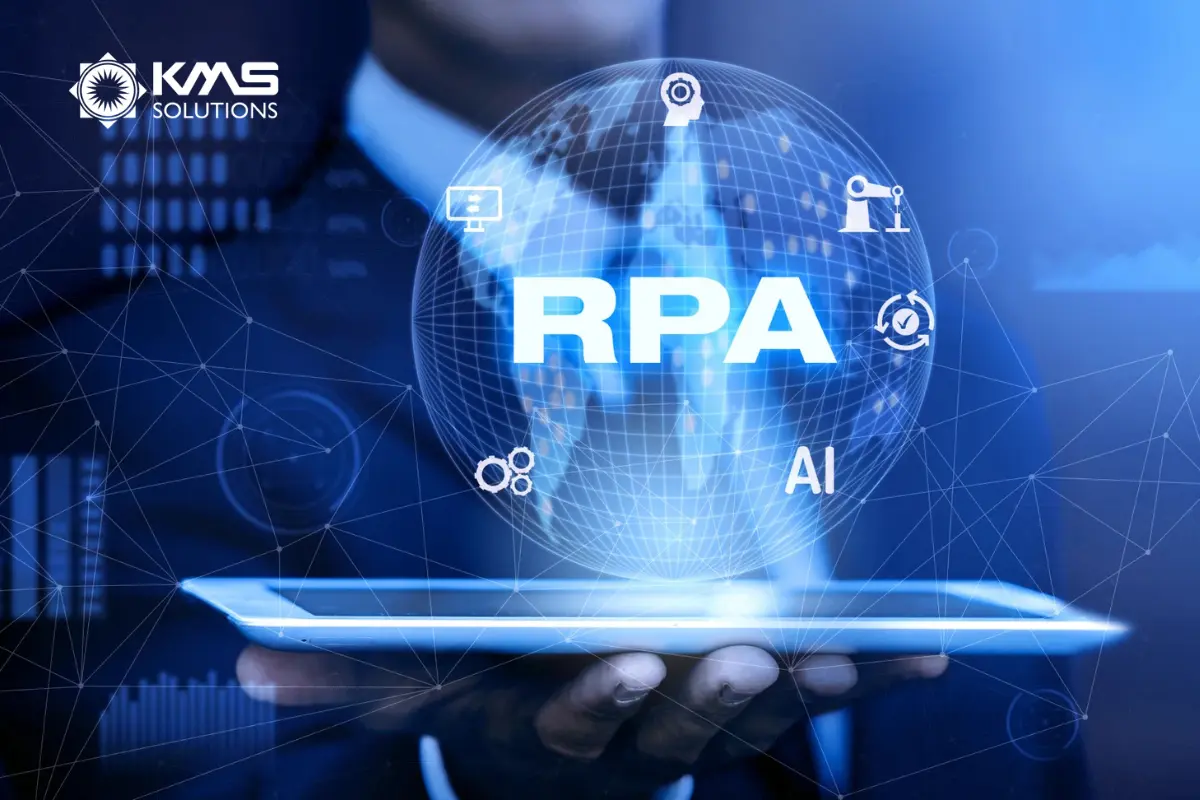
Challenges and Considerations in RPA Adoption
- Legacy System Integration: Integrating RPA into legacy financial systems can be challenging due to compatibility issues.
Solution: KMS Solutions uses middleware or API-based solutions to bridge the gap between older systems and modern RPA technologies, enabling seamless integration. Additionally, KMS recommends a gradual upgrade of legacy systems to enhance compatibility and reduce disruptions. This approach minimizes risk while ensuring systems can efficiently handle RPA functionalities. - Data Security & Compliance: Financial institutions deal with highly sensitive data, requiring strict adherence to regulations like GDPR, PCI DSS, or SOX.
Solution: KMS integrates comprehensive security measures, such as end-to-end encryption, user access control, and detailed audit trails within RPA workflows. This ensures automated processes meet compliance standards, safeguarding against data breaches and regulatory penalties. KMS also works closely with compliance teams to ensure bots are designed to handle regular regulatory updates seamlessly. - Change Management and Employee Resistance: Employees may fear automation will reduce their job security, or they may be hesitant to adopt new technologies.
Solution: KMS Solutions implements structured change management programs, focusing on communication and transparency to clarify that RPA will enhance, not replace, employee roles. KMS provides comprehensive training programs to reskill staff, equipping them with the knowledge to work alongside automation. This helps employees transition smoothly and alleviates resistance by demonstrating how RPA frees up time for more strategic tasks. - Scalability: RPA implementations often start small but need to scale as the organization grows, potentially creating issues in expanding automation.
Solution: KMS designs RPA solutions with scalability in mind, ensuring they can grow in complexity and volume. The use of cloud-based architectures and modular automation workflows allows bots to be easily replicated or modified as business demands increase. This ensures that as the organization grows, the RPA systems can handle higher workloads without needing complete reconfiguration. - Skill Gaps: Implementing and managing RPA requires specific technical skills, which may be lacking in traditional finance teams.
Solution: KMS Solutions offers extensive training programs, designed to upskill in-house teams on managing and maintaining RPA bots. KMS also provides ongoing support and consultancy, ensuring that your teams can effectively manage RPA operations and troubleshoot issues. Moreover, KMS deploys intuitive RPA platforms, which can be used without deep coding knowledge, allowing finance professionals to manage automation with minimal technical expertise.
Through these deep, tailored solutions, KMS Solutions ensures that RPA deployments not only address technical and operational challenges but also align with long-term organizational goals, delivering sustained value across financial processes.
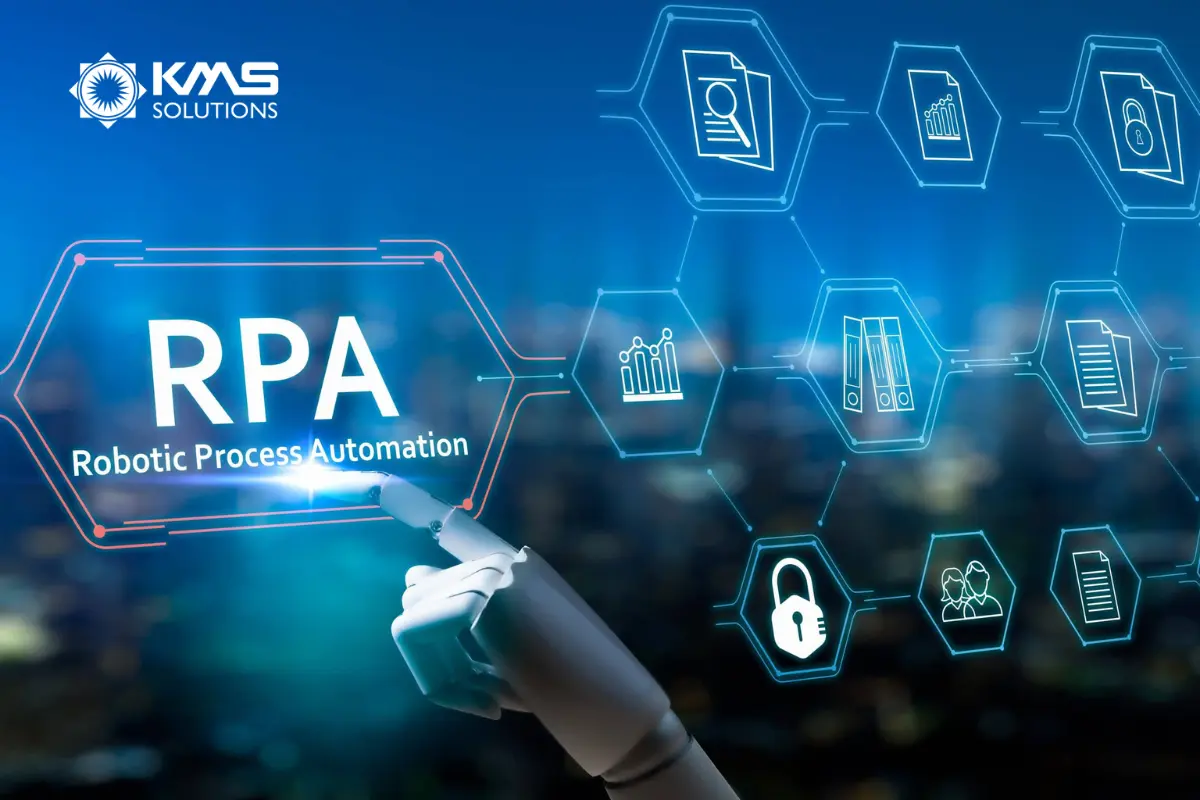
Unlock the Power of RPA in Finance with KMS Solutions’ Expertise
Robotic Process Automation is transforming finance by enhancing efficiency, reducing costs, and increasing accuracy. Thus, having the right experts that can help financial institutions maximize the RPA benefits is essential.
KMS Solutions offers tailored RPA solutions that help finance teams operate more efficiently. Here’s what makes our approach unique:
- Industry Expertise: We bring deep experience in the financial sector, understanding your unique needs and challenges. Our experts have worked with various financial institutions, helping them navigate the complexities of RPA implementation, from initial planning to full-scale deployment.
- Scalable Solutions Customized for Your Busienss: Our RPA implementations are customized to fit your specific processes. We start by thoroughly analyzing your existing workflows to identify the best opportunities for automation. Whether it’s automating routine accounting tasks or streamlining compliance processes, we tailor our RPA solutions to align with your business goals. Moreover, our RPA solutions are designed to scale as your business grows, helping cover more processes or handle larger workloads without disrupting operations.
- End-to-End Support: At KMS Solutions, we provide end-to-end support throughout your RPA journey. From initial consultation and process assessment to deployment and ongoing maintenance, we are with you every step of the way. Our team ensures a smooth transition, providing the necessary training and support to make sure your employees can work effectively alongside RPA bots.
- Proven Success: Our clients have seen significant improvements, such as a 40% reduction in manual data entry time and enhanced compliance reporting. We are committed to helping you achieve similar results.
- Focus on Compliance and Security: Financial institutions operate in a highly regulated environment, and compliance is non-negotiable. Our RPA solutions are designed with compliance and data security in mind, ensuring that every automated process adheres to industry regulations and maintains the highest level of data integrity. We use best-in-class security protocols to protect your sensitive information.
KMS Solutions is committed to helping financial institutions harness the power of RPA to overcome operational challenges and achieve their strategic goals. Contact KMS Solutions today for a tailored RPA consultation to kickstart your automation journey.
FAQ Section (Optional)
What types of processes are ideal for RPA in finance?
Processes that are repetitive, rule-based, and data-heavy are ideal for RPA in finance, such as accounts payable, financial reporting, and compliance monitoring.
How does KMS Solutions simplify RPA adoption?
KMS Solutions provides customized RPA implementations, expert guidance, and a phased deployment approach to ensure smooth adoption and maximum ROI.




